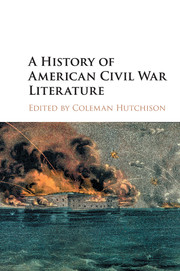Book contents
- Frontmatter
- Dedication
- Contents
- List of Illustrations
- Notes on Contributors
- Preface
- Acknowledgments
- Part I Contexts
- Part II Genres
- Part III Figures
- 12 Walt Whitman
- 13 War and the Art of Writing: Emily Dickinson's Relational Aesthetics
- 14 Herman Melville and the Civilian Author
- 15 Looking at Lincoln
- 16 Frederick Douglass, Violence, and Abraham Lincoln
- 17 Mary Boykin Chesnut: Epic and Miniature
- 18 Mark Twain
- 19 Replay: William Faulkner and the Civil War
- 20 Robert Penn Warren's Civil War
- 21 Natasha Trethewey's Civil War
- 22 Afterword: Archiving the War
- Recommendations for Further Reading
- Index
14 - Herman Melville and the Civilian Author
from Part III - Figures
Published online by Cambridge University Press: 05 December 2015
- Frontmatter
- Dedication
- Contents
- List of Illustrations
- Notes on Contributors
- Preface
- Acknowledgments
- Part I Contexts
- Part II Genres
- Part III Figures
- 12 Walt Whitman
- 13 War and the Art of Writing: Emily Dickinson's Relational Aesthetics
- 14 Herman Melville and the Civilian Author
- 15 Looking at Lincoln
- 16 Frederick Douglass, Violence, and Abraham Lincoln
- 17 Mary Boykin Chesnut: Epic and Miniature
- 18 Mark Twain
- 19 Replay: William Faulkner and the Civil War
- 20 Robert Penn Warren's Civil War
- 21 Natasha Trethewey's Civil War
- 22 Afterword: Archiving the War
- Recommendations for Further Reading
- Index
Summary
Herman Melville sat the war out. Forty-one at the start of hostilities and suffering from physical and emotional infirmities, he never joined the fighting and never directly contributed to the war effort as a civilian. Nor did he ever catch more than a fleeting glimpse of combat action. Nevertheless, his interest in the war was intense. From his safe vantage points in Pittsfield, Massachusetts, and New York City, Melville formed diverse opinions about the conflict, and he chose to express them in poetic form. Battle-Pieces and Aspects of the War (1866) – a collection of seventy-one poems and one prose “Supplement” composed mostly in the aftermath of the fall of Richmond – contains Melville's complex thoughts on the bloody events of 1861–1865. Melville justifies the war while denouncing its violence, exalts its heroes while demystifying the martial ideal, and demonizes the enemy only to identify with his suffering. He locates slavery, “man's foulest crime,” at the root of the conflict, yet all but ignores African Americans as agents in it. He describes the North's victory as a divinely decreed triumph of “Right” over “Wrong,” but argues for a pragmatic agenda of reconciliation. And this assortment of sentiments, ranging from “patriotic” to “treasonous” (as Melville's contemporaries understood the terms), is presented to the public not from the perspective of a soldier or a witness to the fighting but from that of a “concerned civilian.”
Melville's distance from the fields of combat is frequently mentioned by critics. It is the implicit theme, for example, of the most comprehensive study of his war years, Stanton Garner's The Civil War World of Herman Melville (1993), which moves back and forth in space to highlight the contrast between Melville's relatively unruffled domestic life in the North and the perils encountered by his cousin Colonel Henry Gansevoort who fought in the Southern front. As another critic put it, Gansevoort military exploits were, for Melville, “a source of family apprehensiveness, masculine envy, and ultimately access to an experience he was conscious of missing.” Like many other men of his generation who stayed home, Melville must have suffered some wounds to his masculine pride and conscience.
- Type
- Chapter
- Information
- A History of American Civil War Literature , pp. 211 - 226Publisher: Cambridge University PressPrint publication year: 2015

